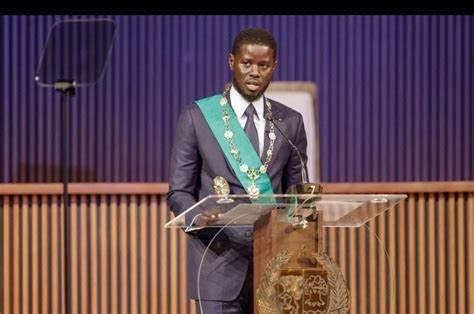On April 2nd, 2024, Senegal reached another milestone in its democratic journey. The inauguration of Bassirou Diomaye Faye, Africa’s youngest elected president, solidified the nation’s reputation as a beacon of stability amidst the turbulent currents in the West African region.
This moment stands in contrast to several neighbors grappling with military rule, a reminder of Senegal’s unbroken string of democratic transitions since independence from France in 1960.
However, President Faye’s ascension was not without its tremors. Former President Macky Sall’s attempt to postpone the election cast a shadow over Senegal’s democratic credentials over the years.
Thankfully, the Senegalese people and the Constitutional Council stood firm, ensuring the election proceeded. This episode, while unsettling, ultimately strengthened the nation’s democratic fabric.
Faye’s path to the presidency reads like a political thriller.
A member of the African Patriots of Senegal for Work, Ethics and Fraternity (PASTEF) Party or Patriots of Senegal he founded in 2014 and used for the presidential race just a week after his release from prison alongside Ousmane Sonko, the party’s leader who was disqualified due to controversial conviction by the past president Sall government.
Ousmane Sonko and Faye had been detained following protests that erupted in the country after the former President’s plan to postpone the elections.
Faye was a beneficiary of Sonko’s immense popularity, a sentiment fueled by their shared experience of detention under Sall’s rule.
Sonko denounced the charges against him as politically motivated, aimed at eliminating a formidable opponent. The authorities even dissolved the PASTEF party, accusing it of inciting violence.
President Faye enters the office armed with a bold agenda.
The 44-year-old former tax collector, nicknamed “Mr. Clean” for his reputation for integrity, has pledged relentless action on poverty, injustice, and corruption that plague Senegal.
He will work towards national reconciliation to mend the social fabric strained by recent political turmoil.
As a self-described left-wing populist, Faye champions systemic change and pan-Africanism to reclaim Senegal’s economic sovereignty.
This vision includes seeking alternatives to France’s perceived economic stranglehold and exploring a monetary reform to rescue the Senegalese economy from the CFA franc.
While this proposal resonates with many yearnings for economic independence, it also raises concerns over the potential economic instability, particularly considering the recent democratic setbacks in the Sahel region.
The new President of Senegal beyond the currency reform he intends to pursue promised to renegotiate resource deals like gas, oil, and fishing control to ensure a fairer share of the wealth for the Senegalese people.
The upcoming production from a newly discovered gas field adds urgency to this objective.
He further vows to make fighting corruption the centerpiece of his administration, targeting embezzlers of public funds and strengthening the integrity of the security forces in Senegal.
A strong advocate for checks and balances will emphasize the need for a clear separation of power between the executive and judiciary arms with the planned re-introduction of the office of the Vice President.
Faye’s victory has undeniably boosted Senegal’s image as a democratic champion.
Young Africans across the continent see him as a potentially transformative figure, a symbol of hope that challenges the status quo and paves the way for a new generation of leaders in Africa.
However, his lack of prior experience in high office raises questions about his ability to navigate the complexities of governance.
His sole venture into politics was an attempt at the mayoral contest in his hometown.
Skeptics believe Faye may soon discover that governing effectively demands more than just the charisma and public support that propelled him to victory.
Despite these concerns, the streets of Dakar are filled with a sense of cautious optimism. Supporters celebrate, hopeful that the new administration will finally address the longstanding issues of poverty and corruption that have plagued Senegal for years.
History, however, provides a cautionary tale. Former President Sall was inspired by similar hopes when he was first elected. Still, his tenure had been marred by accusations of backsliding on democratic principles despite the achievements recorded in the past ten years.
President Faye must prioritize national unity and avoid succumbing to the temptations of power.
It is expected that the new Senegalese leader will use his closeness with the neighboring nations of Mali, Burkina Faso, and Niger to return to the regional bloc, the ECOWAS.
The success of Faye and the PASTEF party will hinge on providing inclusive governance, fostering economic growth that benefits all Senegalese, and most importantly, safeguarding the hard-won democratic stability that sets Senegal ahead in the region.
Only time will tell if President Faye can transform his bold promises into tangible change, proving himself not just a symbol of hope but a leader capable of taming Senegal’s long-standing challenges and promoting prosperity and accelerated development.

